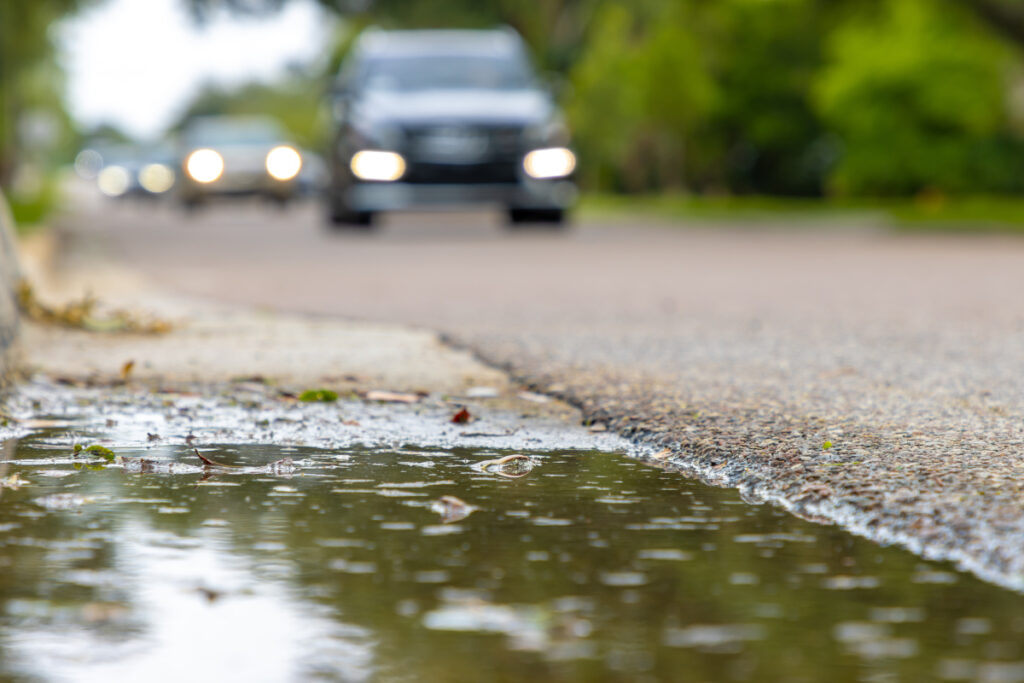
Stormwater pollution occurs much more frequently than you might think. Stormwater is generally any water resulting from precipitation that “runs off” streets, lawns, and other surfaces. Be it heavy rain or slowly melting snow, this stormwater can carry pollutants with it as it cycles into stormwater systems, such as storm drains, culverts, or detention basins. These pollutants can then end up in surface waters or aquifers/soil. Pollutants can stem from activity or runoff on industrial, commercial, and construction sites, but can just as easily stem from residential sites.
Common pollutants
Some pollutants homeowners may be discharging unknowingly include sediments, floatables (natural or manmade floating debris), pesticides, herbicides, organic materials, metals, oil and grease, bacteria and viruses, nitrogen, and phosphorus. Sediments, floatables, and oil and grease are common runoff from driveways in residential areas. Sediment, floatables, pesticides, herbicides, organic materials, bacteria and viruses, nitrogen, and phosphorus are common runoff from residential lawns and gardens. Metals, oil and grease, nitrogen, and phosphorus are all linked with automobile usage. Other factors, like soil erosion, animal waste, landscaping, and septic systems contribute to these pollutants showing up in stormwater as well.
According to EPA data, high density residential areas, like many areas of Marion County, typically result in a substantial increase in total suspended solids, phosphorus, nitrogen, lead, and zinc pollution. Commercial and construction sites cause most of the suspended solid pollution, which results from sediments, erosion, floatables, and particulate matter in stormwater.
How to help
- Watch for improper disposal of hazardous wastes, illegal discharge of pollutants, unapproved dumping of substances, or improper care procedures taken by industrial, commercial, or construction companies you see in the county.
- Spread awareness of common products used in residential areas that can contribute to pollution.
- Reduce use of herbicides and pesticides, litter, fertilizers, detergents, and pick up animal waste near areas of heavy water flow or before precipitation events.
- Further your education on stormwater pollution by checking out the resources at the end of this article.
- Report any suspected pollution of stormwater.
How to report concerns
To report concerns about Marion County stormwater pollution, fill out this form. In the form, you must provide your full name, email address, and address. You should use this form to report illicit discharge, environmental concerns, or suspected deposition of pollutants into the stormwater system. There are specific options, such as to report tattoo shops, public pools, private wells, and more. There is also the option to record concerns about indoor air quality, hazardous materials, and any specific environmental complaints. The form will be reviewed by the Marion County Public Health Department.
You can also report cases involving stormwater runoff from active construction sites, open dumping of trash or debris, and discharges of pollutants from industrial facilities with wastewater or stormwater permits on IDEM’s site. This option allows you to remain anonymous if preferred but is more specific as to what can be reported.
More resources
For a list of extra resources and answers to more questions about stormwater, household hazardous waste, and what you can do to improve waterways in Marion County, visit Indy’s guide to stormwater for the general public. For more information about common pollutants in our waterways, read this article from the EPA.
